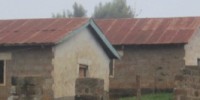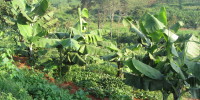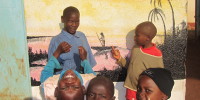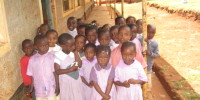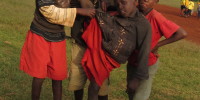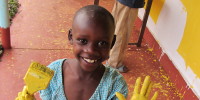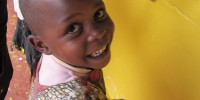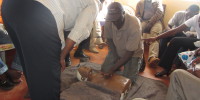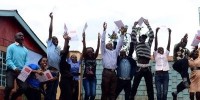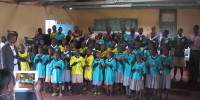Programs
The CYEC’s residential program is based on a boarding school model, which provides a safe and healthy environment for former street-dwelling and other vulnerable children and youth.
Currently, over 140 children and youth reside at the CYEC. Residents of the CYEC are provided with all of life’s essentials including meals, clothing, toiletries, shoes, school uniforms and supplies, etc.
A house mother and house father ensure that all of the children’s basic needs are met. The CYEC’s Residential Program, along with the Life Skills Program, strives to develop values and behavior patterns to prepare these young people for a successful program exit.
Health Services
A registered nurse is present at the CYEC five days a week to tend to the children and youths’ health needs. Services include treatment of minor ailments, chronic conditions and nutritional therapies.
Club and Sports Activities
The CYEC has a comprehensive program of co-curricular activities including a Natre Club, Art Club and a variety of sports activities.
Educational Program
Education is a vital part of any child’s development. Many of the CYEC’s children and youth have had their education interrupted due to lack of school fees or difficult domestic situations. The CYEC ensures that all of its children and youth attend school through class eight.
Primary School
In 2003 Kenya began providing “free” primary school education to all of its children. However, children must supply their own schoolbooks, uniforms, shoes and even desks. The CYEC ensures that all of its children possess school supplies. The CYEC’s staff assists children in completing their assignments during evening “homework hours”.
Secondary School
The CYEC seeks out sponsors for all of its secondary school-aged children. These sponsorships are applied directly to the youth’s tuition. Youth who are unable to find sponsors or whose interests lie outside of academia are required to partake inVocational Skills Training.
Art Program
The CYEC has an art program that involves activities intended to foster creative self-expression as a form of therapy and general personal development for the Centre’s children and youth. The art program also involves training to provide livelihood opportunities for young people with special talent in the creative arts. The program is a collaborative effort between the Centre, the Zawadi Society and other partner organizations.
Acrobatics Program
Ten boys, ages 8-16, have formed an acrobatics troupe that performs acrobatic stunts at the CYEC and in the local community. The troupe was formed three years ago and since that time, the boys have gained self-confidence, team working and leadership skills. The boys’ routines have gained popularity in and around the CYEC. They have performed at schools, weddings and other community gatherings.
Life Skills Program
Life Skills training is an important component of the CYEC’s programming. The CYEC aims to provide all of its residents with the skills necessary for healthy and fulfilling lives. These life skills include: health and hygiene, financial literacy and saving, leadership, teamwork and social responsibility.
Health Wise
The HealthWise CYEC curriculum was developed in response to a need for socio-emotional development and health focused programs for the
children and youth at the CYEC. The HealthWise CYEC curriculum is based largely on the HealthWise South Africa: Life Skills for Young Adults curriculum.
The three main goals of the South African curriculum were to: reduce transmission of HIV/AIDS, reduce drug abuse and risky behaviors, and increase positive use of free and leisure time among youth.
Despite the similarity of many of the topics in the CYEC HealthWise program to the South Africa HealthWise program, the material for the CYEC program has been extensively adapted to the needs of the children and youth of the CYEC.
The curriculum was last revised in May 2013 and includes the following topics: self-awareness of emotions, appreciating uniqueness, leadership development, managing free time, healthful physical growth, and healthful relationships.
The adaptation of the CYEC program has been on-going since 2011 and has involved a number of individuals and a number of iterations to produce the HealthWise CYEC curriculum in its current form. For more information contact Dr. Linda Caldwell (e-mail: lindac@psu.edu) or Dr. Janelle Larson (e-mail: jbl6@psu.edu).
Aflatoun
Aflatoun is a training program aimed at providing children with the knowledge and skills to improve their lives and the lives of people in their communities. The program is grounded in the belief that children around the world should have an understanding of their rights and responsibilities. Children should also know, and have access to, the financial tools they need to realize these rights. The program has five basic components: personal understanding and exploration, rights and responsibilities, savings and spending, planning and budgeting, and social and financial enterprise. Aflatoun was implemented at the CYEC in 2011.
Leadership Training
Albert Schweitzer’s Leadership for Life program was developed in Ireland and funded by UNESCO. The program actively promotes educational opportunities for young adults all across the globe. Leadership trainings are intended to create a more prosperous, peaceful world with strong and courageous leadership free of bigotry, ambivalence and cultural ignorance. The leadership program began at the CYEC in April 2013.
Vocational Skills Program
The provision of vocational skills is crucial to the empowerment of the Centre’s young people. The CYEC skills training program has two main components: traditional skills and skills for the future. Traditional skills include carpentry, metal work and tailoring. Skills for the future involve fabricating renewable energy equipment and building greenhouses. Linking the two training components aims to equip the learners with recognized skills for the market as currently constituted, while capitalizing on new and emerging trends. Secondary school-aged youth who are not in school must choose a vocational skill to learn.
With financial assistance from the People of Japan, the CYEC’s metal work and carpentry workshops were recently upgraded.

